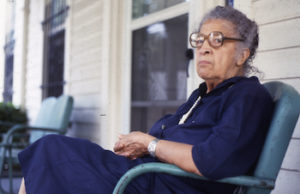
Mary Modjeska Simkins
*On this date 1899, Mary Modjeska Monteith Simkins was born. She was a Black public health reform, social reform, and civil rights activist in the South.
She was the first of eight children born in Columbia, South Carolina. Her parents, Henry and Rachel Monteith, named her after a favorite Polish actress, Helena Modjeska. The Monteiths were a prosperous couple who encouraged their children in academic studies.
After receiving her A.B. degree, Simkins began teaching in the elementary division of the Booker T. Washington School in Columbia and began teaching her favorite subject there two years later. In 1929, she married Andrew W. Simkins and resigned because married women were not allowed to teach in Columbia’s city schools. Two years later, she found work at the South Carolina Tuberculosis Association as its Director of Negro Work. This position lasted until 1942, when she was released due to her participation in American Civil Rights activities.
In 1931, Simkins became the director of Negro Work for the South Carolina Tuberculosis Association, the State's only full-time, statewide Black public health worker. For decades before the 1930s, southern racism and poverty had increased deaths among Blacks from tuberculosis, pellagra, and other illnesses. Simkins created alliances with influential white and Black groups and substantially impacted the health of Blacks in South Carolina.
In 1939, when the South Carolina NAACP was formed, Simkins was already a member of the executive board of the local Columbia NAACP branch and chair of its program committee. She became one of the founders of the state conference, elected to the first executive board, and the first chair of the state programs committee. In 1941, she was elected Secretary of the State Conference, the only woman to serve as an officer. She lost her position with the Tuberculosis Association in 1942, partly because she was increasingly active with the National Association for the Advancement of Colored People (NAACP). During her tenure as Secretary (1941-1957), her work helped the State achieve racial equality.
Perhaps her most significant work occurred in 1950 with the South Carolina federal court case of Briggs v. Elliott. Working with the Reverend Joseph A. DeLaine, president of the Clarendon County NAACP, she helped write the declaration for the school lawsuit that asked for the equalization of Clarendon County Black and white schools. The case was eventually reworked to become one of several individual cases set up to directly challenge the “separate but equal” doctrine in the Supreme Court case of Brown v. Board of Education in Topeka 1954.
Her sometimes controversial activism resulted in attacks on her life and home. In the late 1950s, during the McCarthyism era, the FBI and the House Un-American Activities Committee she was accused of subversive activities. After Brown's decision was passed down, accusations against her intensified. In 1957, for the first time in 16 years, Simkins was not nominated as a candidate for Secretary by the Nominations Committee of the South Carolina NAACP, probably because of charges that she was a communist.
Simkins also supported two predominantly Black third-party platforms, the Progressive Democratic Party in 1940 and the United Citizens Party in the 1970s. A significant figure in South Carolina history, her work spanned more than six decades. She received many honors in her lifetime, including the highest commendation from her home state, the Order of Palmetto. Mary Modjeska Simkins died in 1992.
African Americans and South Carolina:
History, Politics, and Culture
Dr. Phebe Davidson
University of South Carolina-Aiken